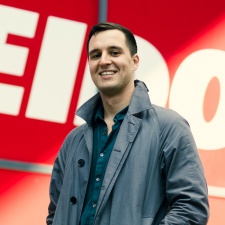Archie Stonehill is a venture capital investor covering the EMEA region at Makers Fund, one of the leading global VC funds that invests in interactive entertainment.
Stonehill joins us for Investor Connector at Pocket Gamer Connects Digital #5, a fringe event which pairs pre-selected developers who are seeking funding with investors.
Before the event takes place next month, we caught up with Stonehill for his thoughts on investment and how the current pandemic has affected getting funding.
PocketGamer.biz: Tell us a bit about your company and its primary investment focus?
Archie Stonehill: We invest in creators all over the globe and from every part of the interactive entertainment industry. Our investments so far have ranged from backend tools to F2P content creators to video sharing platforms and game engines. We generally invest in companies at a series A or late seed stage.
What kind of companies/projects are you interested in?
Broadly, we are interested in any interactive entertainment companies founded by experienced and passionate founders: B2B and B2C companies, technologies, platforms, content, etc. We primarily focus on F2P or heavily GaaS content companies (vs premium content) although there are no hard rules.
More specifically, I look for what I call ‘thesis-driven companies’ founded by entrepreneurs with extensive, relevant experience. The best founders have a strong perspective on their relevant sector and have a thesis on how their company will fit into and change that sector. We also actively identify such trends and look for related companies. While we constantly generate new theses, recent examples include the growth of no-code game engines and companies integrating deeper layers of social features into gameplay.
What are the key advantages for founders when they raise investment from your company?
There are many advantages our founders get when they partner with us, but I will focus on a few that I think are particularly strong at Makers Fund.
Chief among these is the deep industry insight, experience and expertise we provide our founders. This includes us as investors dedicated 100% to the gaming industry and our network of advisors and experts who have years of operational and management experience from every part of the industry.
Makers Fund also has one of the best and most global networks in the industry. We actively develop relationships with key individuals and companies that benefit our founders, including major strategics, later-stage investors, etc. This can facilitate unique partnerships and access for our portfolio companies; for example, our close relationships among Asian games companies have helped many of our startups expand to the region.
Do applicants need a pitch deck and if so, what information should a founder be sure to include to interest you enough to want to know more and have a meeting?
This varies a lot based on the company’s product and founders’ histories. Generally, however, I’d expect at least a pitch deck that covers what their thesis is and includes all the crucial information: what the product or game is, the nature and size of their addressable market, competitive landscape, metrics (if available), and a detailed account of the teams’ experience. If they are actively fundraising, they should also include details on round size and the use of funds.
The most common problem I see in decks is that they do not spend enough time on the team, which is the core of any company.
If their pitch deck includes all that, then I am always up for a meeting.
What do you expect to learn from a founder at the first meeting?
A good first meeting should cover all the things I mentioned above that should be included in a pitch deck.
What makes a first meeting great is all the stuff around that basic information. For example, when founders tell a story of how they got to where they are. Or when I get into a great conversation digging into the details of the founders’ thesis that demonstrates their knowledge.
Other than that, the most important thing I want to learn from a first meeting is what the founder wants and what their vision is. If I know that then I consider the meeting a success.
Could you give any advice for developers or teams for pitching over video calls?
I do not think it is too different from in-person meetings. I generally do find that walking through a deck or demo is very helpful. I would also always suggest founders to have video on if they can (understanding there are restrictions for some) as it is much better for getting to know one another.
How has the investment cycle changed as a result of the Covid-19 pandemic? Typically, how long is it taking to close deals?
I think COVID-19 knocked the typical investment cycle in the industry off a bit, at least in Europe. Normally November-February is quiet and things ramp up around GDC and continue through Gamescom in August. Obviously, this year, the uncertainty generated by the pandemic and GDC’s cancellation meant many founders delayed fundraises, so we ended up having a very busy November to January.
How long deals take to close is highly variable, but I do not believe this has been much affected by COVID – it can be anywhere from one or two weeks up to two months or more if the company setup is more complex. Typically, we try to get to a decision within 10-14 days, as we are very conscious of not wasting founders’ time.
What trends do you see emerging in games over the pandemic that are likely to persist post-pandemic? Conversely, what trends do you think are short term?
The pandemic has accelerated a lot of trends that were already happening, most notably the broader and deeper adoption of online entertainment.
At the micro level, we have noticed two enduring trends. Firstly, we have seen our offline, online and virtual lives merge, intertwine and blur in new and unprecedented ways. For example, ‘real-world’ offline aspects of our lives, such as graduations, weddings and meetings have been forced into online and virtual spaces like Animal Crossing or Red Dead Online. Secondly, we have seen the emergence of a new category of gamers we are calling ‘hangout gamers’ – non-traditional gamers who have embraced social-first gaming experiences. A great example of this is Among Us, a game that is relatively simple in its core mechanics but highly engaging at a social level.
More broadly, these trends and others are bringing us closer to new forms of interactive entertainment that will engage new audiences and bring about new formats. This includes the expansion of live streaming into a truly interactive medium, enabling massively concurrent interactive experience and the advent of proto-metaverse virtual spaces that impact more aspects of our daily lives such as concerts, work life, and self-expression.
Short term there was obviously a significant increase in games adoption and usage; some of this is likely temporary, but some will also be permanent. Similarly, it remains to be seen how much of the investor attention interactive entertainment gained will stick around once the pandemic has subsided.
Want to meet Archie Stonehill at Pocket Gamer Connects Digital #5?
You could meet Stonehill and many more investors online next month by signing up for Investor Connector at Pocket Gamer Connects Digital #5. So if you’re seeking funding, sign up here. Applications close this Monday Feb 1st.
Please note you can only sign up for the Investor Connector if you’re a registered attendee of Pocket Gamer Connects Digital #5. Book your tickets now.
We’re also allocating a limited amount of free passes solely for small indie developers, enabling them to meet investors and publishers, and learn from the industry’s biggest names. If you think you qualify, sign up here.






















